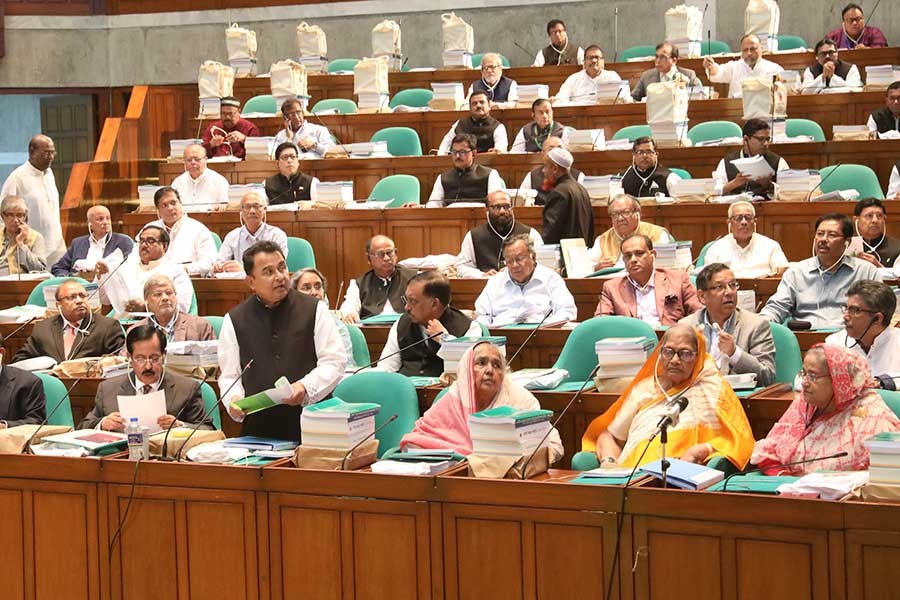Finance Minister AHM Mustafa Kamal, along with the Prime Minister Sheikh Hasina, proposed the national budget for fiscal year 2019-2020 in the Jatiya Sangsad on June 13, 2019.
The proposed budget, amounting to Tk 5,231.90 billion, is the largest-ever in the history of Bangladesh. This budget will be more challenging to implement as the deficit is about 22.78 per cent or Tk 1,453.80 billion.
The proposed budget has set a target to collect Tk 680.16 billion from external sources. This is also the largest-ever target set by Bangladesh in getting foreign loans. If the government can manage this, then private sector borrowing from external sources may gain momentum.
Secondly, it has been proposed that the government will take a loan of Tk 473.64 billion from the local banking system. This is likely to create pressure on the banking system. As a result, banks may fail to achieve target of providing loans to private enterprises. Thus shortage of loan products may hamper private sector growth, which in turn can affect investment growth.
A revenue target of Tk 3,778.10 billion has been set in the proposed budget. This is very ambitious target and will create extra pressure on the National Board of Revenue (NBR). Such extraordinary tax pressure may lead to disputes between taxpayers and collectors.
It's worth mentioning that the target of revenue collection in the current budget was originally Tk 3,392.80 billion. But due to inability of collecting this sum, the target was revised to Tk 3,166.12 billion later. The same fate may be waiting for this year's revenue target as well. The government should be cautious so that the revenue collection target does not create an undesirable situation where taxpayers are harassed by tax collectors.
The government seems to have realised the ground reality that expanding tax net is more effective than increasing the rate. Therefore they are thinking about new ideas through which the number of taxpayers can be increased.
The finance minister has emphasised on stopping under- and over-invoicing culture. Practical actions need to be taken in this regard as under- and over-invoicing are mainly done by very influential businessmen. In such ways, money is siphoned out of the country. This is why it needs to be stopped. Though it is necessary to take such steps for the betterment of the economy, it may be very challenging for the government politically.
This year, the long-awaited VAT law will be implemented. Everyone is concerned about the modalities under which the new law will become effective. It is understood that under this new regime, the government wants to ensure transparency through a hassle-free VAT collection mechanism that will also avoid double and triple taxation. It is clear that this could be one of the many tools through which the government will try to ensure to meet its revenue target in the proposed budget. But the mechanism needs to be easy, secure and harassment-free for the VAT-payers, collectors and middlemen i.e. the business community. It is a good sign that the government is going to introduce several slabs: 5.0 per cent, 7.5 per cent, 10 per cent and 15 per cent of VAT based on specific product types and utility, instead of previous single 15 per cent VAT slab.
A few segments like agro-machinery and showrooms rented out by women entrepreneurs etc., have been exempted from the proposed VAT. While this is an intriguing initiative, there is quite a lot that still needs to be done. Awareness should be created among the population about how the entire VAT system works, how VAT is calculated based on the different categories and so on.
The Finance Minister in the budget speech mentioned about a Banking Commission, but nothing was stated about how long it will take for it to be set up or whether the government is feeling its urgency at this point of time.
In the proposed budget, cash incentives of 20 per cent has been provided to export of pharmaceuticals products, Tk 1.0 billion for training and capacity building, another Tk 1.0 for start-up entrepreneurs, and special attention has been given to trade relevant infrastructure development. However, it was expected by businessmen in some sectors that the government would come up with funds for trade-relevant capacity-building and infrastructure development such as development of design centres, laboratories, testing facilities and products display centres both at home and abroad for some promising sectors. Such facilities would have allowed these sectors to become export-oriented. Export diversification initiatives should get more attention from the government in this age of economic diplomacy and trade relationship.
The proposed budget envisions initiatives relevant to rural development but enough technical and financial supports have not been ensured to materialise these visions.
Social safety net programmes were highlighted in the budget speech. However, private sector pension scheme and a few other social initiatives have not made any progress at all.
Small and medium-sized entrepreneurs (SMEs), leather, jute, textiles, tourism and blue economy are some of the other sectors that have got special attention in the proposed budget. In his budget speech, the Finance Minister recalled the government's target of developing 100 economic zones that will ensure employment generation of 10 million people. But it has not highlighted if there have been any specific development in matters of land allocation, approach road development, providing industrial utilities or other projections at making these functional.
The policymakers should identify and discuss in parliament over the next one month about the challenges of implementing the proposed mega budget and take corrective measures to overcome the limitations.
Views expressed here are of the writer's himself.
Md Joynal Abdin is Executive Director, DCCI Business Institute (DBI).


